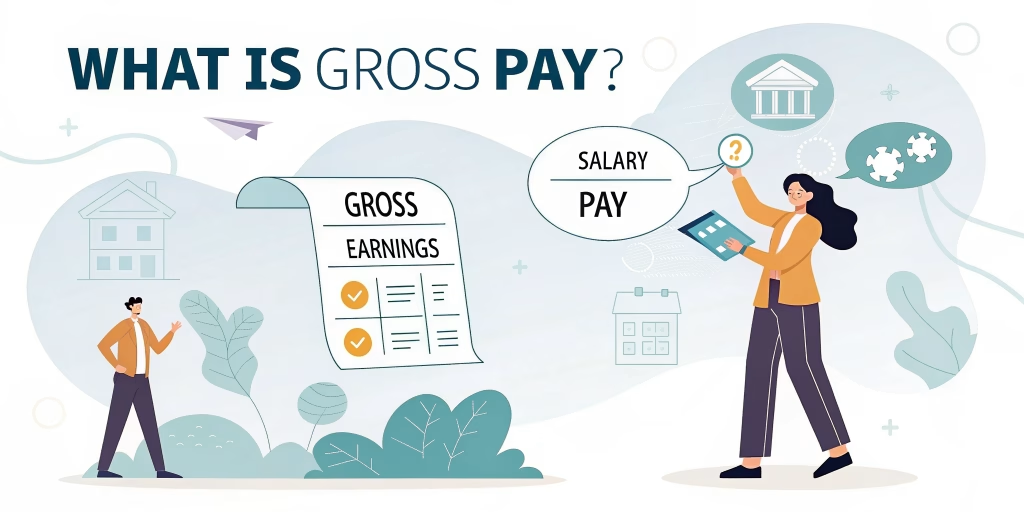Main Takeaway: Gross pay is the full money you earn before any deductions. Understanding it lets you plan your budget, save wisely, and avoid paycheck surprises.
Your first paycheck can feel like a puzzle. You see numbers for hours, rates, taxes, and benefits. It’s easy to get lost. One term you must know is gross pay. Gross pay is the full amount you earn before anything is taken out. This guide will explain gross pay in plain, simple words. You’ll learn how to figure it out, why it matters, and how it becomes the money you actually take home. By the end, payroll will feel much less scary.
What Does Gross Pay Mean?
Gross pay is all the money you earn for work. Think of it as the whole pie before you slice pieces off. Those slices are taxes, insurance, and other costs. Gross pay includes:
- Your regular wages or salary
- Any overtime pay
- Bonuses or commissions
- Paid time off pay (like vacation or sick days)
If you work hourly, it’s your rate times hours worked. If you have a salary, it’s your yearly pay split across each pay period.
How to Calculate Gross Pay
- Hourly Workers
- Multiply your hourly rate by the number of hours you work.
- Add overtime pay if you work more than 40 hours in a week. Overtime is usually 1.5× your regular rate.
- Example: If you earn $15 per hour and work 45 hours one week, your gross pay is:
- Regular pay: $15 × 40 = $600
- Overtime: $15 × 1.5 × 5 = $112.50
- Total gross pay: $712.50
- Salaried Workers
- Take your annual salary and divide it by the number of paychecks you get each year.
- Add any extra pay, like bonuses or commissions, during that period.
- Example: If your salary is $52,000 per year and you get paid twice a month (24 times), each paycheck’s gross pay is:
- $52,000 ÷ 24 = $2,166.67
- $52,000 ÷ 24 = $2,166.67
From Gross Pay to Net Pay
After you earn your gross pay, your employer removes several items. What you get left with is net pay—the money you bring home. Here’s what usually comes out first:
- Pre-Tax Deductions
- Retirement plan contributions (like a 401(k))
- Health insurance premiums
- Flexible spending accounts (FSA) or health savings accounts (HSA)
- Taxes
- Federal income tax
- State and local income tax (if your state has it)
- Social Security tax
- Medicare tax
- Post-Tax Deductions
- Extra insurance (like life or disability insurance)
- Union dues or professional fees
- Charity donations you choose to take from your paycheck
After these slices are cut out, the rest is net pay. You can use net pay to cover rent, food, bills, and savings.
Why Gross Pay Matters
- Budgeting
- Knowing gross pay helps you estimate taxes and deductions. Then you know roughly how much net pay you’ll get.
- You can plan monthly bills, savings, and spending with more confidence.
- Loan and Rental Applications
- Lenders and landlords look at gross pay to decide how much you can borrow or pay in rent.
- They use gross pay because it shows your total earning power.
- Lenders and landlords look at gross pay to decide how much you can borrow or pay in rent.
- Benefit Eligibility
- Your gross pay often determines how much your employer will match in retirement plans.
- It can affect eligibility for health plans or other perks.
- Tax Planning
- Pre-tax deductions lower your taxable income.
- Knowing your gross pay helps you fill out tax forms like the W-4 correctly, so you don’t owe too much or get too large a refund.
Tips for Tracking Your Pay
- Check Your Pay Stub Every Time
Look at hours, rates, and deductions. Make sure nothing looks wrong. - Understand Each Line
If you see a code for retirement or insurance, ask HR what it means. - Update Your W-4
Whenever you have a big life change—like a baby or a new side job—adjust your withholding. - Use Simple Apps
Budgeting apps can link to your bank to track net pay automatically. - Ask Questions
If you spot an error, talk to payroll or HR. Fixing a mistake early saves hassle later.
Quick Glossary
- Gross Pay: Money earned before any deductions.
- Net Pay: Money you receive after all deductions.
- Overtime Pay: Extra pay for hours beyond your normal workweek.
- Pre-Tax Deduction: Amount removed before taxes, like retirement contributions.
- Post-Tax Deduction: Amount removed after taxes, like charity donations.
Conclusion
Gross pay is the starting point of every paycheck. It shows your full earnings before slices for taxes, insurance, and extras. By understanding gross pay, you can:
- Plan your budget with clear expectations
- Apply confidently for loans or rent
- Manage taxes and benefits better
- Spot errors in your paycheck early
Next time you open your pay stub, you’ll see gross pay, know exactly what it means, and use it to guide your financial choices. With this knowledge in hand, you’ll feel more secure, informed, and ready to handle your money with confidence.
Common Questions
Q1: What if my overtime rate is different?
A: Always check your company policy. Some jobs pay double time or other rates for extra hours.
Q2: Is bonus pay part of gross pay?
A: Yes. Any extra earnings before deductions count as gross pay.
Q3: Are tips included in gross pay?
A: For tipped workers, yes. Tips you report to your employer become part of your gross pay.





